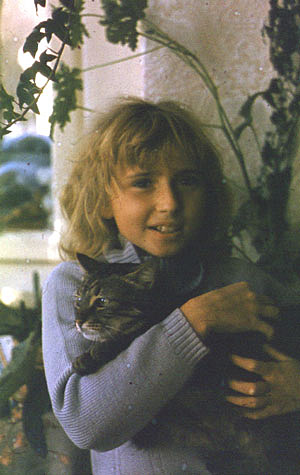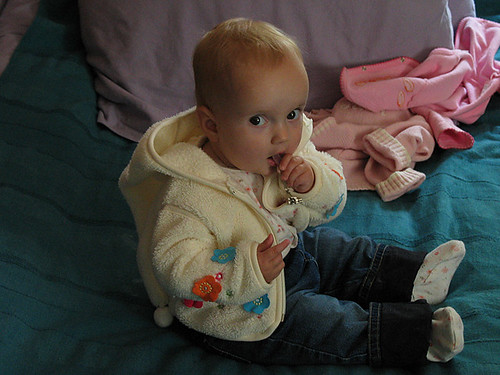Yevgeniya Albats vs Anna Arutunyan - this seems to be the Russian LJ's new war.
Albats (LJ user ymalbats) has received 153 comments on this post so far.
Arutunyan (LJ user arutunyan) has received 512 comments on this post.
Most of it is in Russian, including Masha Gessen's reaction - here.
***
More on the conflict - in my previous post.
Friday, October 27, 2006
Thursday, October 26, 2006
Random links, in Russian and in English, in no particular order, and a few brief notes - I hoped to write more about much of this, but with Marta teething and other stuff, I have no time whatsoever. I tried to post this last night, but Blogger was down.
- Hilarious and absolutely pointless: Oleg Kuvaev's video-blogging experiments (RUS) - here (2 videos) and here. Kuvaev is the creator of Masyanya.
- My last night's GV translation of Kuvaev's intro to the first two videos and some other LJ-related stuff - here.
- In my Saturday GV translation - on the blog war that's going on Russia now - I mentioned Anna Arutunyan's 2005 piece on Russian bloggers - and then on Sunday, she gets grilled (RUS) by Yevgenia Albats on Radio Echo Moskvy for an opinion piece she wrote on Anna Politkovskaya for the Moscow News.
Arutunyan's piece is rubbish - I know I have to be more specific when I write something like this, but I really don't have time for this now. Okay, just one tiny thing, a quote:
Today is the fourth anniversary of the end of the siege - and it's October, not November.
Still, the reaction of Albats has been inappropriate, misplaced, hysterical. It's bad for the general cause or whatever, to act like this: with friends like this, there's no need for enemies. Putin had referred to a newspaper article when he said those unfair things about Politkovskaya - and it would've been so much more useful if Albats had found the authors supplying Putin with this info and grilled them instead. Also - a few xenophobic callers drawn to the show by Arutunyan's Armenian last name have added to the terribly bitter aftertaste.
- In her LJ - which lay dormant for a year - Arutunyan writes (RUS) about the humiliating Albats experience and gets plenty of comments: here and here.
- Arutunyan's really long text on the media (RUS), published in Novyi Mir last year - here.
I'm posting the link not because I hope to read the text later, no, but because there've been many discussions about Russian journalism lately - how ironic that it's Politkovskaya's death that has inspired these discussions, not one of those silly Izvestia pieces on Ukrainian language (RUS)... It would've been more natural to start hearing more about kadyrovtsy using their cell phones to film torture, but no, instead there are all those pseudo-academic attempts to determine whether Politkovskaya was a journalist or an activist.
- A response to Arutunyan from the eXile, on what I assume is the Moscow News, the paper that published that pathetic Politkovskaya piece - here's the link, but I want to quote it here, because if it's indeed the Moscow News, then it's sort of-kind of relevant - and funny - even though it's from a year ago as well:
- Wanted to post a few links to Bolshoi Gorod - but their site seems to be down now. Who knows, maybe they got hacked for running too much of pro-Georgian content.
- Almost forgot: an opinion piece by Evgeny Morozov on the blog war, in the International Herald Tribune - here.
Several people forwarded the piece to me yesterday and here's part of my response:
- Hilarious and absolutely pointless: Oleg Kuvaev's video-blogging experiments (RUS) - here (2 videos) and here. Kuvaev is the creator of Masyanya.
- My last night's GV translation of Kuvaev's intro to the first two videos and some other LJ-related stuff - here.
- In my Saturday GV translation - on the blog war that's going on Russia now - I mentioned Anna Arutunyan's 2005 piece on Russian bloggers - and then on Sunday, she gets grilled (RUS) by Yevgenia Albats on Radio Echo Moskvy for an opinion piece she wrote on Anna Politkovskaya for the Moscow News.
Arutunyan's piece is rubbish - I know I have to be more specific when I write something like this, but I really don't have time for this now. Okay, just one tiny thing, a quote:
When terrorists held an auditorium hostage during the Nov. 2002 production of Nord-Ost, she spoke to the hostage takers and made their demands public.
Today is the fourth anniversary of the end of the siege - and it's October, not November.
Still, the reaction of Albats has been inappropriate, misplaced, hysterical. It's bad for the general cause or whatever, to act like this: with friends like this, there's no need for enemies. Putin had referred to a newspaper article when he said those unfair things about Politkovskaya - and it would've been so much more useful if Albats had found the authors supplying Putin with this info and grilled them instead. Also - a few xenophobic callers drawn to the show by Arutunyan's Armenian last name have added to the terribly bitter aftertaste.
- In her LJ - which lay dormant for a year - Arutunyan writes (RUS) about the humiliating Albats experience and gets plenty of comments: here and here.
- Arutunyan's really long text on the media (RUS), published in Novyi Mir last year - here.
I'm posting the link not because I hope to read the text later, no, but because there've been many discussions about Russian journalism lately - how ironic that it's Politkovskaya's death that has inspired these discussions, not one of those silly Izvestia pieces on Ukrainian language (RUS)... It would've been more natural to start hearing more about kadyrovtsy using their cell phones to film torture, but no, instead there are all those pseudo-academic attempts to determine whether Politkovskaya was a journalist or an activist.
- A response to Arutunyan from the eXile, on what I assume is the Moscow News, the paper that published that pathetic Politkovskaya piece - here's the link, but I want to quote it here, because if it's indeed the Moscow News, then it's sort of-kind of relevant - and funny - even though it's from a year ago as well:
Dear Ms. Arutunyan,
If just one single article in your newspaper was as clearly written and
grammar-mistake-free as this sic letter to Rudnitsky, you guys might actually land your first paid advertiser, rather than having to continually suck at the teat of a disgraced oligarch. [...]
- Wanted to post a few links to Bolshoi Gorod - but their site seems to be down now. Who knows, maybe they got hacked for running too much of pro-Georgian content.
- Almost forgot: an opinion piece by Evgeny Morozov on the blog war, in the International Herald Tribune - here.
Several people forwarded the piece to me yesterday and here's part of my response:
sounds a bit too alarmist - and irrational... like, nossik is the virtual putin or something...
and the controversial figure in charge (Sup's chief blogging officer is Anton Nossik, the father of the Russian Internet and, among other things, a former associate of Gleb Pavlovsky, the Kremlin's spindoctor).
[...]
Who would be to blame for destroying a viable and vibrant public forum and turning it into another Kremlin- medicated sanatorium? Nossik, Sup's blog boss, who increasingly resembles Ivan the Terrible killing his son in that famous Repin painting, should top anyone's list of suspects.
take marina litvinovich, who seems to be an archfoe of putin's regime now, creator of PravdaBeslana.ru, whose presence in the blogosphere is quite noticeable (lj user abstract2001) - she used to work for gleb pavlovsky at the time putin became president, too - she was one of those who helped him get to power...
if you think about her, then it's really hard to understand why nossik is so evil. i'm not saying he is an angel, i don't know that much about him, but i would've preferred to read a more convincing argument against him...
also, marat guelman (lj user galerist) - he used to be involved in exactly the same things as pavlovsky, manipulating politics, not just in russia, but also in ukraine, too, very notorious, and now he seems to be so innocent, he gets beaten up in his gallery, putin-bush-osama cartoons from his gallery get detained by the russian customs, it all does seem to be connected with the georgia scandal, with the rotten regime and all that - and he's anti-sup, too - despite his "kremlin spindoctor" past...
i mean, go figure...
Wednesday, October 25, 2006
Marta's still very feverish, especially at night... I haven't called the doctor - because she's not coughing, acts the same way as she always does, just takes naps more often and isn't all over the place all the time. I admit that I'm scared that the doctor would just prescribe antibiotics - I don't trust them. I think I can see where the new teeth might break through - I do hope they are the reason for her fever... But if she remains feverish tomorrow, I'll call the doctor.
Monday, October 23, 2006
Such a good day today/yesterday (Sunday) - must be because of the weather, Indian Summer. One of those days when I feel so happy to live in Kyiv.
Must be also because there are very few cars here on weekends, unlike the rest of the week.
Kyiv has grown so big; night traffic at the Besarabka/Khreshchatyk corner that I see from our window is mesmerizing - all the glowing, non-stop, like an electronic music video.
I've noticed today that during the day, when the crowd on Khreshchatyk isn't too drunk yet, there's a lot of beautiful Ukrainian language out there: normally, I pay more attention to what people look like, not how they speak, but today I kept eavesdropping on the bits of relaxed weekend conversations in Ukrainian - and loved it.
Loved it so much that, on the way to the tiny and cozy courtyard of St. Sophia's, I suddenly had a craving for something Ukrainian to read. I stopped at a tiny Ukrainian-language bookstore that exhibits a selection of its books outdoors when the weather's nice (located on that tiny street that starts near Zoloti Vorota and goes parallel to Volodymyrska towards St. Sophia's). I bought Lesya Ukrainka's biography (13 hryvnias/$2.60, published in 1971, signed by the author, Anatol Kostenko, for poet Oleksa Novytsky) and a work on Petro Mohyla - read from both of them while Marta was taking her afternoon nap. Loved it, of course.
On the way back home, I passed a group of krishna/hippie/dervish kind of people who do the Whirling Dervish kind of dance on Khreshchatyk every weekend. Two girls were circling around in a trance, in those amazingly beautiful skirts of theirs, a beautifully happy-looking bearded man was beating the beat for them on a drum, and another guy was playing some repetetive tune on a flute. A dozen or so people stood nearby, watching. Among them was an old woman - a village woman, most likely, though she wasn't wearing a headscarf - and she was singing, she was sharing the beat with the whirling girls and singing in Ukrainian, the song that I think I recognized because Mishah used it to calm Marta down in the first months - but he had been performing it in that exaggerated, funny "goat" voice, while the old woman on Khreshchatyk was singing it beautifully - "Oy, u vyshnevomu sadku, tam soloveiko shchebetav, dodomu ya prosylasya, a ty mene vse ne puskav..." (Update: mp3 is here - thank you, R. Smith!!!)
A lovely day.
***
Two pictures from St. Sophia's:
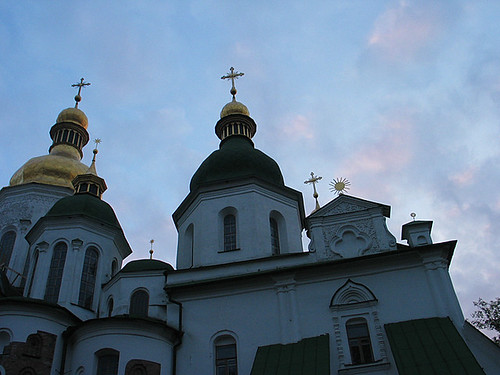
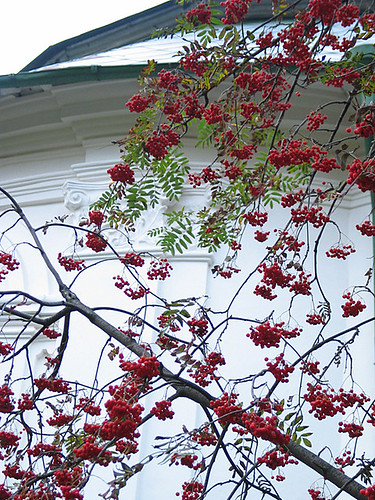
Must be also because there are very few cars here on weekends, unlike the rest of the week.
Kyiv has grown so big; night traffic at the Besarabka/Khreshchatyk corner that I see from our window is mesmerizing - all the glowing, non-stop, like an electronic music video.
I've noticed today that during the day, when the crowd on Khreshchatyk isn't too drunk yet, there's a lot of beautiful Ukrainian language out there: normally, I pay more attention to what people look like, not how they speak, but today I kept eavesdropping on the bits of relaxed weekend conversations in Ukrainian - and loved it.
Loved it so much that, on the way to the tiny and cozy courtyard of St. Sophia's, I suddenly had a craving for something Ukrainian to read. I stopped at a tiny Ukrainian-language bookstore that exhibits a selection of its books outdoors when the weather's nice (located on that tiny street that starts near Zoloti Vorota and goes parallel to Volodymyrska towards St. Sophia's). I bought Lesya Ukrainka's biography (13 hryvnias/$2.60, published in 1971, signed by the author, Anatol Kostenko, for poet Oleksa Novytsky) and a work on Petro Mohyla - read from both of them while Marta was taking her afternoon nap. Loved it, of course.
On the way back home, I passed a group of krishna/hippie/dervish kind of people who do the Whirling Dervish kind of dance on Khreshchatyk every weekend. Two girls were circling around in a trance, in those amazingly beautiful skirts of theirs, a beautifully happy-looking bearded man was beating the beat for them on a drum, and another guy was playing some repetetive tune on a flute. A dozen or so people stood nearby, watching. Among them was an old woman - a village woman, most likely, though she wasn't wearing a headscarf - and she was singing, she was sharing the beat with the whirling girls and singing in Ukrainian, the song that I think I recognized because Mishah used it to calm Marta down in the first months - but he had been performing it in that exaggerated, funny "goat" voice, while the old woman on Khreshchatyk was singing it beautifully - "Oy, u vyshnevomu sadku, tam soloveiko shchebetav, dodomu ya prosylasya, a ty mene vse ne puskav..." (Update: mp3 is here - thank you, R. Smith!!!)
A lovely day.
***
Two pictures from St. Sophia's:


Friday, October 20, 2006
Among other things, Natalya Gevorkyan writes (RUS) about Putin's/Russia's image in the West, the damage done to it in the past two months. Her feeling seems to be that Putin is not the puppet master anymore - which doesn't make him less responsible for the situation, especially considering that all this could possibly be the beginning of an emergency that would keep him in his chair for the third term.
***
Valeriy Panyushkin has decided to quit political writing and is moving to Gala, a glossy magazine, of all things. He feels both good and bad about it; his last column in Gazeta.ru is here (RUS).
Rumor has it, Masha Gessen is moving to Gala together with Panyushkin. Her last Moscow Times column is here.
On the one hand, it's such a pity - first, Politkovskaya, and now these two. But on the other hand, at least they are alive, and, honestly, I'd rather read Masha's wonderful vignettes about her kids (RUS) than be fed the same old political crap, no matter how finely written, over and over again.
***
Valeriy Panyushkin has decided to quit political writing and is moving to Gala, a glossy magazine, of all things. He feels both good and bad about it; his last column in Gazeta.ru is here (RUS).
Rumor has it, Masha Gessen is moving to Gala together with Panyushkin. Her last Moscow Times column is here.
On the one hand, it's such a pity - first, Politkovskaya, and now these two. But on the other hand, at least they are alive, and, honestly, I'd rather read Masha's wonderful vignettes about her kids (RUS) than be fed the same old political crap, no matter how finely written, over and over again.
Thursday, October 19, 2006
I asked my father today: he has worked as a tennis coach since 1958 - that is, he began earning money as a tennis coach that year, but worked for free before that, since around 1951.
Marta is crying a lot less when she sees him at home now - but she sobbed when he came up to us in the park this afternoon.
Marta is crying a lot less when she sees him at home now - but she sobbed when he came up to us in the park this afternoon.
Looking for stuff to translate for Global Voices is getting more and more difficult: too often, I start feeling dirty after just a few minutes of browsing through Russian LJs.
One guy is shutting down his journal because the Russian segment of LJ is now owned by the "kikes." Another is asking on whose side you'd be fighting if you lived during WWII - and gets 1,192 responses. And one of the most popular searches now is on the upcoming Russian March.
I'm so tired of reading through other people's hatred.
And Putin, he seems to be courting this militant segment of the electorate, tries to be more like them and, possibly, lure them away from their leaders, the competitors. And it shouldn't bother him that what he's doing doesn't look nice to most people outside Russia: they aren't his target audience.
***
I've translated a selection from Natasha Raslambekova's war diaries for Global Voices - here.
One guy is shutting down his journal because the Russian segment of LJ is now owned by the "kikes." Another is asking on whose side you'd be fighting if you lived during WWII - and gets 1,192 responses. And one of the most popular searches now is on the upcoming Russian March.
I'm so tired of reading through other people's hatred.
And Putin, he seems to be courting this militant segment of the electorate, tries to be more like them and, possibly, lure them away from their leaders, the competitors. And it shouldn't bother him that what he's doing doesn't look nice to most people outside Russia: they aren't his target audience.
***
I've translated a selection from Natasha Raslambekova's war diaries for Global Voices - here.
Sorry for the silence: I'm re-adjusting to the city life.
Back home, I keep having flashbacks to when Marta was a newborn - pretty amazing... I can't believe it ever happened.
I can't believe we've ever lived in Pushcha Vodytsya, either...
***
Today, I decided to walk up the stairs from Franka Sq. to the presidential administration, with Marta in the stroller - and, after the first set of stairs, a cop came up to me and helped me carry the stroller all the way to the top. Extremely nice, even though I could easily do it myself - have had a lot of practice in Pushcha.
***
In the park today, the color of the benches shocked me: gray. Not yellow, not blue - just gray.
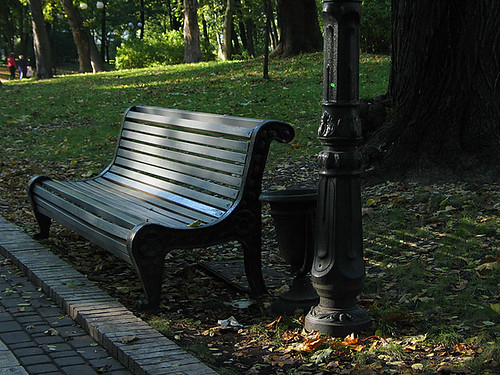
***
Marta is still scared of my father, but I can feel she's slowly getting used to him. Too slowly - she doesn't have much time before we move back to Moscow.
My father has raised hundreds of kids in his 50 years or so as a tennis coach - and now his own granddaughter starts sobbing whenever he comes close. How sad. He doesn't look or sound his best, though, and, most likely, never will. Even sadder.
Back home, I keep having flashbacks to when Marta was a newborn - pretty amazing... I can't believe it ever happened.
I can't believe we've ever lived in Pushcha Vodytsya, either...
***
Today, I decided to walk up the stairs from Franka Sq. to the presidential administration, with Marta in the stroller - and, after the first set of stairs, a cop came up to me and helped me carry the stroller all the way to the top. Extremely nice, even though I could easily do it myself - have had a lot of practice in Pushcha.
***
In the park today, the color of the benches shocked me: gray. Not yellow, not blue - just gray.

***
Marta is still scared of my father, but I can feel she's slowly getting used to him. Too slowly - she doesn't have much time before we move back to Moscow.
My father has raised hundreds of kids in his 50 years or so as a tennis coach - and now his own granddaughter starts sobbing whenever he comes close. How sad. He doesn't look or sound his best, though, and, most likely, never will. Even sadder.
Tuesday, October 17, 2006
Moving back to Besarabka was stressful: we haven't got much stuff, but for some reason it occupied way too much space - you should've seen the van we were riding in, how packed it was, and me in the midst of it all, with Marta asleep on my tit, all stuck in an unexpected traffic jam. You wouldn't have seen any of it, though, because of the van's fancy window tint. A family straight out of a Kusturica film.
***
My computer's charging cable broke Saturday night - and I nearly went crazy, positive that I'll be arriving to the wonderful adsl connection at Besarabka without a computer. But thankfully, there is an Apple store in Kyiv (across the street from the stadium on Velyka Vasylkivska), so Mishah went there and bought a new cable today.
(Velyka Vasylkivska seems to be the only new, post-Soviet street name that no one in Kyiv feels comfortable using - most people still call it the old way, either Krasnoarmeyskaya or Chervonoarmiyska: Red Army Street.)
***
The speed of my internet connection back home is amazing: so fast, it scared me at first! I can't imagine having spent four months on that terrible dialup, managing to accomplish anything at all!
***
Khreshchatyk is so noisy, but it's nice for a change, civilization.
***
The weather is horrible, no one's prepared for the cold, there're still plenty of people wearing summer shoes, etc, even though it's colder now than it was on December 31 last year.
***
Marta is so not used to my father, she starts sobbing every time she sees him. We don't know what to do about it - any advice? Is she always gonna be this timid or is this the age thing? Poor papa... (She's not scared of the cat at all, however. Quite the opposite...)
***
My computer's charging cable broke Saturday night - and I nearly went crazy, positive that I'll be arriving to the wonderful adsl connection at Besarabka without a computer. But thankfully, there is an Apple store in Kyiv (across the street from the stadium on Velyka Vasylkivska), so Mishah went there and bought a new cable today.
(Velyka Vasylkivska seems to be the only new, post-Soviet street name that no one in Kyiv feels comfortable using - most people still call it the old way, either Krasnoarmeyskaya or Chervonoarmiyska: Red Army Street.)
***
The speed of my internet connection back home is amazing: so fast, it scared me at first! I can't imagine having spent four months on that terrible dialup, managing to accomplish anything at all!
***
Khreshchatyk is so noisy, but it's nice for a change, civilization.
***
The weather is horrible, no one's prepared for the cold, there're still plenty of people wearing summer shoes, etc, even though it's colder now than it was on December 31 last year.
***
Marta is so not used to my father, she starts sobbing every time she sees him. We don't know what to do about it - any advice? Is she always gonna be this timid or is this the age thing? Poor papa... (She's not scared of the cat at all, however. Quite the opposite...)
Friday, October 13, 2006
We didn't have hot water again, for about 24 hours, not too long, but I panicked still, because it's already cold outside, and it's very cold inside the apartment (central heating doesn't get turned on until, I guess, Oct. 15, the day we're moving out of here), and no one I asked knew when it'd be restored.
So yeah, we are moving back to Besarabka on Sunday, after four months spent here. I'm happy and I'm not at the same time. Having to fight my way past all those cars with Marta not sleeping in her stroller anymore but STANDING in it - that's gonna be an adventure... But she'll have fun - so much new stuff for her to discover, including our two black cats...
She met her first horse two days ago, by the way - and got really scared. Cried non-stop until mama carried her away. Me, I've realized that I tend to fall in love with horses - I talk to them as if they know what I'm saying, and I have a hard time walking away, and I keep thinking about these encounters. Crazy. I rode a horse only once - for, like, 30 seconds...
The horse Marta and I met on Tuesday is one of the two that were brought to the sanatorium about half a month ago. I think they are planning to use them to entertain the visitors and their kids, at least this is what the guy taking care of them told us. A few years ago, in Kuchma's time, a notorious Russian TV guy, Kiselyov (don't remember his first name, and he's not the same person as NTV's Kiselyov), kept his horses at the sanatorium's stables - everyone here informs you of this at some point - but after the Orange Revolution, they stood empty and neglected. Now, there's Viking, the beauty we've met, and another one. I fed Viking some grass and am totally charmed.
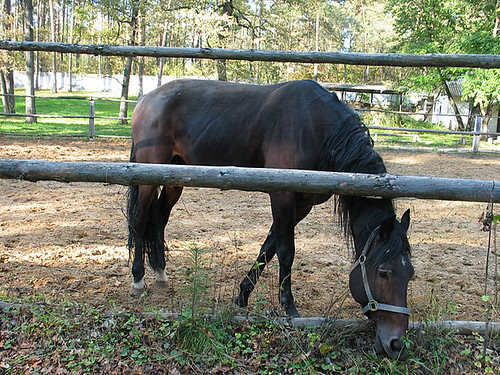
Basically, he's another reason I don't feel like leaving...
So yeah, we are moving back to Besarabka on Sunday, after four months spent here. I'm happy and I'm not at the same time. Having to fight my way past all those cars with Marta not sleeping in her stroller anymore but STANDING in it - that's gonna be an adventure... But she'll have fun - so much new stuff for her to discover, including our two black cats...
She met her first horse two days ago, by the way - and got really scared. Cried non-stop until mama carried her away. Me, I've realized that I tend to fall in love with horses - I talk to them as if they know what I'm saying, and I have a hard time walking away, and I keep thinking about these encounters. Crazy. I rode a horse only once - for, like, 30 seconds...
The horse Marta and I met on Tuesday is one of the two that were brought to the sanatorium about half a month ago. I think they are planning to use them to entertain the visitors and their kids, at least this is what the guy taking care of them told us. A few years ago, in Kuchma's time, a notorious Russian TV guy, Kiselyov (don't remember his first name, and he's not the same person as NTV's Kiselyov), kept his horses at the sanatorium's stables - everyone here informs you of this at some point - but after the Orange Revolution, they stood empty and neglected. Now, there's Viking, the beauty we've met, and another one. I fed Viking some grass and am totally charmed.

Basically, he's another reason I don't feel like leaving...
Thursday, October 12, 2006
One of the most depressing GV translations I've ever done - here... More depressing than maddening, though the latter emotion was there, too.
Wednesday, October 11, 2006
Was looking through the Russian papers to see what's being written about Politkovskaya - ran into an Izvestia piece on the "language issue" in Ivano-Frankivsk, titled quite radically: Diktatura Movy ("The Dictatorship of the [Ukrainian] Language").
It begins with a quote from Russia's foreign ministry:
Then, this:
To read the rest of the piece, my dear readers, you'll have to learn Russian, and me, I'm going to bed. Na dobranich, spokoinoy nochi.
:)
It begins with a quote from Russia's foreign ministry:
"Elimination of the Russian language in Ukraine can no longer be ignored, [tough measures] now spread not just into the sphere of official communication, but to [everyday use] as well. The Ivano-Frankivsk officials have succeeded in this. In the city, it is prohibited to speak Russian on the premises of educational institutions, it is not allowed to hold mass Russian-language events and to paste notes in Russian. The Committee of Public Control, acting as the "language inquisition," watches over the observance of these rules. The Russian community's complaints aren't being accepted."
Then, this:
[...] Ivano-Frankivsk, named after a writer known for these words - "Study and leave politics alone" - has become the most Russophobic city of Ukraine. It is a miniature copy of Ukraine, which openly suffers from three problems: financial, gas and language. All of them are connected with Russia.
To read the rest of the piece, my dear readers, you'll have to learn Russian, and me, I'm going to bed. Na dobranich, spokoinoy nochi.
:)
President Putin said this about Politkovskaya in an interview with Suddeutsche Zeitung today (in Russian, here):
He also called Politkovskaya's views "too radical" - and "perhaps, due to this radicalism, she didn't have such a strong influence on the political life in the country and even less so in Chechnya."
The way he sat quietly throughout the whole Beslan horror must be a beautiful norm, then. Would've been too radical to make a statement on something as radically horrible right away.
And the way he lashed out at the non-murderous Georgians is also a norm, I guess, not something radically silly.
I have to say that her political influence (and I think that the experts will agree with me) was insignificant inside the country, and, most likely, she was more noticeable in the human rights and mass media circles in the West. Hence, I think - and one of our newspapers has stated this correctly today - that to the current government in general and to the Chechen authorities in particular, Politkovskaya's murder has done much more harm than her publications.
He also called Politkovskaya's views "too radical" - and "perhaps, due to this radicalism, she didn't have such a strong influence on the political life in the country and even less so in Chechnya."
The way he sat quietly throughout the whole Beslan horror must be a beautiful norm, then. Would've been too radical to make a statement on something as radically horrible right away.
And the way he lashed out at the non-murderous Georgians is also a norm, I guess, not something radically silly.
Tuesday, October 10, 2006
I was browsing pretty aimlessly, then decided to check the Photo of Grozny on Request page - it's not there anymore, I wonder why and where those wonderful guys are now - and then somehow I found myself at the Virtual Grozny forum, a very friendly place, it seems, and there, I downloaded 28 pages of Natasha Raslambekova's 1994 war diary - and I've just started reading it, and it's so heartbreaking, so horrible, and written in such an intimate way... It's in Russian, unfortunately, but those of you who do know the language, take a look at it...
Update: I've read half of the text, an overwhelming account. I hope someone will translate it one day. It's like reading a blog - one of those Haifa blogs, for example... It's raw, full of typos, lots of incredible, vivid details... Hard not to cry reading it. I wish I could translate it, but no, I can't.
Update 2: When I write that it's full of typos, I don't mean it's bad - it's making it real, too real. And "full of typos" is an exaggeration - there are some, that's it.
Natasha is 38 and lives in France with her family now. Her daughter was a little girl then and remembers only some of it.
What hell...
Update 3: She deliberately kept politics and the goriest moments out of her narrative.
I'm tremendously happy about this find - though 'happy' is probably not the most appropriate word...
Update: I've read half of the text, an overwhelming account. I hope someone will translate it one day. It's like reading a blog - one of those Haifa blogs, for example... It's raw, full of typos, lots of incredible, vivid details... Hard not to cry reading it. I wish I could translate it, but no, I can't.
Update 2: When I write that it's full of typos, I don't mean it's bad - it's making it real, too real. And "full of typos" is an exaggeration - there are some, that's it.
Natasha is 38 and lives in France with her family now. Her daughter was a little girl then and remembers only some of it.
What hell...
Update 3: She deliberately kept politics and the goriest moments out of her narrative.
I'm tremendously happy about this find - though 'happy' is probably not the most appropriate word...
A diversion of sorts: C.J. Chivers' piece on Georgian wine in the New York Times travel section...
[...] This is quintessential Kakheti, where almost every household makes wines, often for personal use but also for sale. Each household is intensely proud of its achievements. Wine is fundamental, a taproot of Georgian culture and psyche. In the villages, making and drinking wine is not a mannered, refined pursuit, but as basic as drawing water from a well, a thing to be enjoyed regularly and simply.
A notice to those who explore this life: According to tradition, Georgians believe that guests come from God. Moreover, ask about a family’s wine and you will have paid your interviewee a high compliment and be offered a challenge.
What often will follow is a detour into Georgian hospitality, which is an adventure in itself, as you will be greeted as if you have come on foot over the snowy ridge, cold, lonely and starving. Food will be piled, wine will be served, and countless toasts will be made, no matter how many toasts you have already survived. [...]
There is an incredible stench on the other side of the Russian blogosphere: guys with tiny dicks are celebrating Anna Politkovskaya's murder.
LJ user misssing_link (Yuri Tyurin) posts pictures of fireworks; "Happy victory day, Russia," he writes. LJ user alekcei calls Politkovskaya "the enemy of my people" and writes that although "the death of any person is an irreparable tragedy," when "there's one enemy less, it always makes one happy." LJ user doppel_herz writes that "perhaps Grabovoy will manage to revive the talented journalist." Three pages of comments on the first post, five pages on the second, seven on the third.
A Kyiv acquaintance now living in Canada said over beer a few years ago that Politkovskaya was "a nutcase, a pre-menopause Valeriya Novodvorskaya." He's probably celebrating now, too.
LJ user misssing_link (Yuri Tyurin) posts pictures of fireworks; "Happy victory day, Russia," he writes. LJ user alekcei calls Politkovskaya "the enemy of my people" and writes that although "the death of any person is an irreparable tragedy," when "there's one enemy less, it always makes one happy." LJ user doppel_herz writes that "perhaps Grabovoy will manage to revive the talented journalist." Three pages of comments on the first post, five pages on the second, seven on the third.
A Kyiv acquaintance now living in Canada said over beer a few years ago that Politkovskaya was "a nutcase, a pre-menopause Valeriya Novodvorskaya." He's probably celebrating now, too.
Monday, October 09, 2006
So very painful to read Natasha Mozgovaya's February 2006 interview with Anna Politkovskaya, so unbearable - and so interesting. But it's in Russian, and it's huge, and it'd be very difficult to pick things to translate and to leave the rest untranslated... Sorry.
A quick GV translation:
Anna Politkovskaya, a Russian journalist famous for her critical coverage of Chechnya and Vladimir Putin's policies, was shot to death in Moscow Saturday. Russian-language blogs are awash in speculation on who might be behind the murder.
Anton Nossik (LJ user dolboeb, aka "the Guru of Russian Internet") points (RUS) at Ramzan Kadyrov, Chechnya's prime minister, without naming him; the Russian Yandex Blogs portal currently lists this post as the third most popular one in the Russian blogosphere:
Anna Politkovskaya, a Russian journalist famous for her critical coverage of Chechnya and Vladimir Putin's policies, was shot to death in Moscow Saturday. Russian-language blogs are awash in speculation on who might be behind the murder.
Anton Nossik (LJ user dolboeb, aka "the Guru of Russian Internet") points (RUS) at Ramzan Kadyrov, Chechnya's prime minister, without naming him; the Russian Yandex Blogs portal currently lists this post as the third most popular one in the Russian blogosphere:
The murder of Politkovskaya: cui prodest
The name of the contractor is absolutely obvious - it's just enough to know some widely available facts.
I'll cite them here, for the public record.
Fact number one. While Chechnya's prime minister [Sergei Abramov] was closely working on investigating the issue of who, how and where extorts money in Chechnya for "rebuilding the republic," he kept getting attacked. The last attack - a car crash - was the fifth one, if I remember correctly. And the most successful one. Abramov was out of the game.
Fact number two: An hour and a half before her death, Anna Politkovskaya told about her latest investigations in an interview to the Caucasus Knot. She was investigating - surprise! - the same mechanisms of money extortion, corruption and stealing of state funds that Abramov had been looking for in his time (and, to his misfortune, kept finding). Politkovskaya had the misfortune to declare publicly that she had the documents at her disposal that would allow her to recreate the whole corrupted scheme of financing the "Chechen national projects." The journalist's fate was decided.
Fact number three: of course, if there had only been an interview with the Caucasus Knot, Politkovskaya would have been alive now. Unfortunately, somewhat earlier, she managed to tell about it in an interview with Radio Liberty. And it's likely that the people whose plans could've been disrupted by her investigation had their own sources of information, which allowed them to know the current interests and creative plans of the deceased.
What has to be noted is the [...] recklessness that accompanied the contractor's decision to tie the long-awaited "fact of liquidation" to the happy state holiday [Vladimir Putin's birthday]. I have no doubts he'll be allowed to get away with Politkovskaya, just as his father was forgiven for the jihad he had declared against Russia. Because there are plenty of false directions in which the investigation could be diverted. [...] As for the actual hit man, I think the casting for the role of his corpse has already begun in the morgues of Chechnya's hospitals.
Sunday, October 08, 2006
From the New York Times obit:
***
From the Novaya Gazeta site (RUS):
In an interview in April with The New York Times, Ms. Politkovskaya said she had evidence of torture in Chechnya by Mr. Kadyrov’s police and other gunmen, including at least one witness who had been tortured by Mr. Kadyrov himself. Mr. Kadyrov has always vigorously denied such allegations.
***
From the Novaya Gazeta site (RUS):
We do not know today who killed her and what for. We can only mention two main versions. Either this was the revenge of Ramzan Kadyrov, about whose activities she wrote and spoke a lot. Or it was done by those who want the suspicion to fall on the current Chechen premier, who, having turned 30, may aspire for the president's post.
Anna Politkovskaya was shot dead Saturday, and it's sad and shocking, and it's hard to think of anything to say now.
Rest in peace, Anna.
***
This is what I wrote about Politkovskaya roughly four years ago, after the Dubrovka hostage crisis:
***
Anna Akhmatova died on March 5, 1966 - the day of Stalin's death 13 years earlier.
Anna Politkovskaya was killed on October 7 - Putin's birthday.
The irony of such coincidences is so exquisitely dumb.
Rest in peace, Anna.
***
This is what I wrote about Politkovskaya roughly four years ago, after the Dubrovka hostage crisis:
[...] Politkovskaya has so far dissected an incredible expanse of Chechnya's tissue, following blood streams from the battlegrounds in Grozny to the refugee camps in the neighboring Ingushetia; from the army barracks in Daghestan to the offices of corrupted generals in Moscow; from the war zone nursing homes to the out-of-the-way homes of bereaved families of the missing Russian soldiers.
She doesn't seek to be in the spotlight but gets caught in it anyway: either through her noble initiatives to help the most miserable among her sources, or through the government's clumsy yet menacing attempts to silence her. The last time she drew everyone's attention was during the hostage crisis, when the Chechen terrorists named her as one of those they would have liked to negotiate with.
Hours after Politkovskaya arrived in Los Angeles to receive a Courage in Journalism Award from the International Women's Media Foundation, she had to start planning her trip back to Moscow. Around noon Thursday, October 24, a Russian TV channel arranged a live phone conversation with her, and she explained that at the moment she was having problems exchanging her Delta ticket for an earlier date. I thought that was so ridiculous, having to worry about tickets when the lives of nearly 1,000 people were at stake. And only when my American colleague and I visited Politkovskaya at her Moscow apartment ten days after 10/23, did I understand that the time difference, not red tape, had been to blame: it was the middle of the night when the news of the siege reached LA, and many people were asleep.
Smiling ironically, she told us how she had wanted to see Hollywood and the celebrities' mansions while she was in California. That was when I first caught myself feeling as cozy and ordinary as if I were sitting in the kitchen with my landlady: a daughter greeting us at the door; a son stopping by briefly to say hello to us and tell his mother he was off to work; a dear old Doberman, so excited about the guests that we all worried he might have a stroke. But Politkovskaya then began telling us how hard it had been to think of something to write in the note for the award ceremony she was going to miss, and I knew I was back in the kitchen of a woman whose magnitude was close to Andrei Sakharov's.
In her LA note she wrote: "I have always believed that Russian journalism, first and foremost, is the journalism of action. The journalism of taking the step that you simply must take. Please pray for us, those who are directly affected by this crisis. And of course, say a prayer for me. I am ever more convinced that the war in Chechnya must be brought to an end. And today, the time has come for me to appeal to President Bush and plead with him to use his influence on President Putin to stop the bloodshed in Chechnya, and to prevent it in Moscow."
Back in Moscow, she did meet with the terrorists, and with some of the hostages, and she returned to the "Nord-Ost" building a few more times that day, October 25, carrying boxes of juice for the people inside. Journalists and firefighters contributed their own money to buy the first portion of juice; later - almost too late - the government decided to participate, too. (Some of the J-7 juice must have seeped inside the theater, while some of us, outside, were musing over the deeper meaning of the brand's slogan: "Everybody loves their freedom.")
In Politkovskaya's kitchen, we drank tea and did not talk about October 25 - by that time she had already described her errands in the bi-weekly Novaya Gazeta and other publications. She told us about the people she knew among the hostages: her daughter's 24-year-old friend, a "Nord-Ost" orchestra member; her own childhood friend with her family. The young musician survived, and Politkovskaya published an interview with him later; her friend lost her son and husband, and Politkovskaya attended the double funeral, and wrote about it, too.
My colleague asked her about the current racist moods in Moscow, and Politkovskaya confirmed that they were on the rise. Regardless of whether we want it or not, she said, the hostage crisis has only made it worse for all those who've been demonized by the media and the President, those who are routinely called "the blacks" here. Two weeks on, in mid-November, she published the first two stories of a series documenting the newest wave of anti-Chechen abuses in Moscow.
It is a purely post-Soviet phenomenon that the war in Chechnya is nowhere near the end and the discrimination against Caucasians is rampant all over the country - all despite Anna Politkovskaya. Her brave reporting is easily accessible in print and on the Internet; her astonishing book, "A Dirty War: A Russian Reporter in Chechnya" (Harvill Press, London, 2001) is available not just in its English translation but in Russian as well. Her stories cannot have but the most profound impact, and yet, no major changes seem to occur.
***
Anna Akhmatova died on March 5, 1966 - the day of Stalin's death 13 years earlier.
Anna Politkovskaya was killed on October 7 - Putin's birthday.
The irony of such coincidences is so exquisitely dumb.
Saturday, October 07, 2006
Just finished another Georgia translation for Global Voices - and have a craving for Georgian food as a result.
Seriously, though, what's going on in Russia now is so fucked up. If this were a person acting like this, the best way would be to ignore the moron completely. But Russia is too big and important to be ignored.
And the voices of the normal people in Russia are barely audible in all this noise. Reminds me somewhat of the cartoon controversy earlier this year.
And Saakashvili, he should've focused on making the country livable when he came to power, and all the Abkhazias, Ajarias and Ossetias would've come running to him then, and all those hundreds of thousands of Georgians forced to live abroad would've been able to return voluntarily, and instead, they are being deported from Russia now, picked at random, it seems...
But it is surreal, what's going on. Akunin, Tsereteli, schoolkids...
Seriously, though, what's going on in Russia now is so fucked up. If this were a person acting like this, the best way would be to ignore the moron completely. But Russia is too big and important to be ignored.
And the voices of the normal people in Russia are barely audible in all this noise. Reminds me somewhat of the cartoon controversy earlier this year.
And Saakashvili, he should've focused on making the country livable when he came to power, and all the Abkhazias, Ajarias and Ossetias would've come running to him then, and all those hundreds of thousands of Georgians forced to live abroad would've been able to return voluntarily, and instead, they are being deported from Russia now, picked at random, it seems...
But it is surreal, what's going on. Akunin, Tsereteli, schoolkids...
Friday, October 06, 2006
Thank you all for your comments, for encouragement, for reading me. It's very important to me, even though I rarely comment back. Sorry for that.
***
Here's a picture from that trip to Georgia - my mama, little Katso and I - 29 years ago... Terrible quality, you can't really see anything on it, I'm afraid...
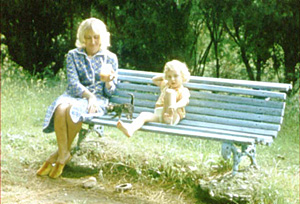
***
Here's a picture from that trip to Georgia - my mama, little Katso and I - 29 years ago... Terrible quality, you can't really see anything on it, I'm afraid...

Thursday, October 05, 2006
It's been so quiet here lately... Is anyone reading this at all?
I'm feeling lonely, I guess.
***
I've just posted a Global Voices translation on the Russia-Georgia cold war circus - here. Crisis, I mean.
Had a masochistic kind of fun working on it.
***
My very first memories are from Georgia: we were there in the fall of 1977 - I was almost 4 then. I swear I remember Tbilisi stone buildings, and the grape leaves covering our hotel's wall, and my father's friend Otar's big belly and his red polo shirt, and then we adopted a kitten in the seaside Lesilidze (that's Abkhazia, right?) and named him Katso, thinking it's the Georgian for "a friend," and I remember him sleeping in my mama's lap on the flight from Adler, and he lived with us in Kyiv for the next 16 years, and died Nov. 23, 1993, when I was in the States for the first time, and I grieved his death a lot, drank heavily for about a week even, despite being underage, and I still miss him, and then a Tbilisi Armenian classmate of mine, a refugee here in Kyiv, laughed really hard when I mentioned the cat's name to her, explaining to me that Katso meant something like 'a stud' - something like muzhik - in Georgian, not the innocent "friend" and not so fitting for a neutered cat...
I'd love to travel to Georgia again one day. And it's such a pity what happened there in the past few decades, and what continues to happen...
I'm feeling lonely, I guess.
***
I've just posted a Global Voices translation on the Russia-Georgia cold war circus - here. Crisis, I mean.
Had a masochistic kind of fun working on it.
***
My very first memories are from Georgia: we were there in the fall of 1977 - I was almost 4 then. I swear I remember Tbilisi stone buildings, and the grape leaves covering our hotel's wall, and my father's friend Otar's big belly and his red polo shirt, and then we adopted a kitten in the seaside Lesilidze (that's Abkhazia, right?) and named him Katso, thinking it's the Georgian for "a friend," and I remember him sleeping in my mama's lap on the flight from Adler, and he lived with us in Kyiv for the next 16 years, and died Nov. 23, 1993, when I was in the States for the first time, and I grieved his death a lot, drank heavily for about a week even, despite being underage, and I still miss him, and then a Tbilisi Armenian classmate of mine, a refugee here in Kyiv, laughed really hard when I mentioned the cat's name to her, explaining to me that Katso meant something like 'a stud' - something like muzhik - in Georgian, not the innocent "friend" and not so fitting for a neutered cat...
I'd love to travel to Georgia again one day. And it's such a pity what happened there in the past few decades, and what continues to happen...
Wednesday, October 04, 2006
Heavy machinery took care of the pits and sand hills today, the landscape is returning to relatively normal:
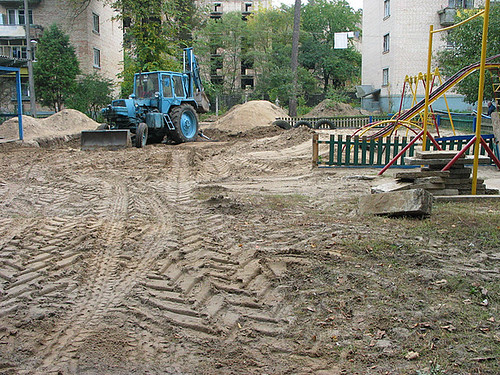
***
On Khreshchatyk, they must've made an attempt to make it look less messy, but ended up creating more chaos: there is now officially marked parking on the sidewalk in the Besarabka-Khmelnytskogo segment, and a thick white line in the middle that's probably there to point where we can walk and where they can drive; some asshole nearly drove over me today; it reminds me of what someone wrote of Belgrade parking a while ago: how all those village newcomers have brought their customs with them - it's true, isn't it, that in a village you can park wherever you feel like, there are no rules there, no sidewalks, no nothing, and this is what Khreshchatyk seems to be turning into.
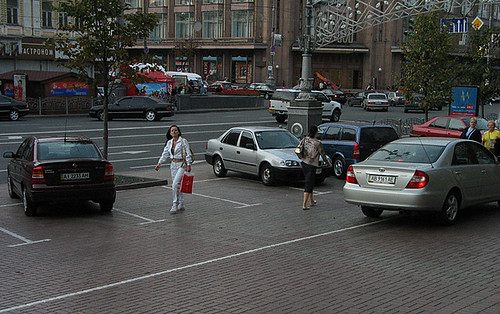
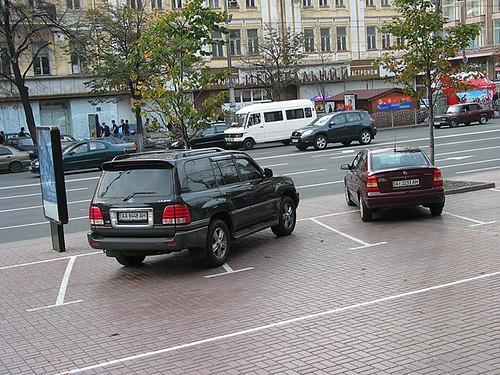
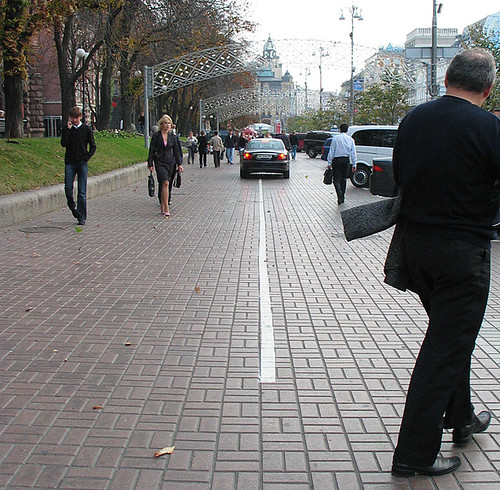

***
On Khreshchatyk, they must've made an attempt to make it look less messy, but ended up creating more chaos: there is now officially marked parking on the sidewalk in the Besarabka-Khmelnytskogo segment, and a thick white line in the middle that's probably there to point where we can walk and where they can drive; some asshole nearly drove over me today; it reminds me of what someone wrote of Belgrade parking a while ago: how all those village newcomers have brought their customs with them - it's true, isn't it, that in a village you can park wherever you feel like, there are no rules there, no sidewalks, no nothing, and this is what Khreshchatyk seems to be turning into.



Tuesday, October 03, 2006
An impromptu Crimean Tatar reading overview...
Politics:
An interview (RUS) with Refat Chubarov, a Ukrainian PM, first deputy head of the Crimean Tatae Mejlis, conducted by Gulnara Bekirova, a Crimean Tatar historian and author, for a Simferopol newspaper in late August this year (reproduced at kirimtatar.com).
Here's why Chubarov voted for Yanukovich as prime minister - and his view on the coalition:
And some more on the "strange bedfellows":
***
History:
Gulnara Bekirova marks two anniversaries - Andrey Sakharov's 85th birthday (May 21) and 30th anniversary of Mustafa Jemilyov's Omsk trial - by quoting this story (RUS):
***
Religion
A June 2004 article (.pdf file) in the ISIM (International Institute for the Study of Islam in the Modern World) newsletter, recently highlighted by the International Committee for Crimea: Islamic Knowledge in Ukraine, by Aleksander Bogomolov, Vice-President of the Center for Middle Eastern Studies and head of the Modern Orient Department at Krymski Institute of Oriental Studies, Kiev, Ukraine.
Rather brief and academically dry - but hey, the subject is so undercovered that any mention seems precious, and when it does get into the spotlight, the tone is often quite hysterical. I was delighted to read this piece, even though it's from two years ago.
Here're a few passages on Islam in Ukraine - in the Soviet times and now:
(Not so brief, sorry.)
Politics:
An interview (RUS) with Refat Chubarov, a Ukrainian PM, first deputy head of the Crimean Tatae Mejlis, conducted by Gulnara Bekirova, a Crimean Tatar historian and author, for a Simferopol newspaper in late August this year (reproduced at kirimtatar.com).
Here's why Chubarov voted for Yanukovich as prime minister - and his view on the coalition:
Election of Victor Yanukovych as Ukraine's premier was predetermined by the formation of the "anti-crisis" coalition. In my view, Our Ukraine and BYuT factions had only two ways to act in this situation: to be in the [...] opposition or to take part in the formation of the Cabinet of Ministers of Ukraine. Honestly, I have a hard time imagining myself in the opposition to the government where the key posts are nominated by president Victor Yushchenko, whom we supported in 2004.
Another motivation that affected my personal position is my understanding of responsibility for solving issues that have to do with well-being of the tens of thousands of our compatriots. Subsequently, what's important to me is the possibility of constructive cooperation with the Cabinet of Ministers of Ukraine.
[...]
The coalition situation is a mess. De facto, the process of creation of the coalition of the Party of the Regions, SPU and Our Ukraine faction began - but wasn't completed. So de jure, the "anti-crisis" coalition, which includes which [the Communist Party of Ukraine], continues to exist. And for me it is unacceptable to be in the same coalition with the Communists.
And some more on the "strange bedfellows":
- I'd also like to know what you think about the election of [Leonid] Grach, known for his attitude toward the Crimean Tatar problem, as the head of the [parliamentary] Committee on Human Rights, Ethnic Minorities and Interethnic Relations. Don't you consider this a serious retreat of the democratic forces?
- Of course, a committee's head plays a certain role in its work, but any decision is adopted during the session by the vote of the committee's members. [...]
In general, though, [...] democracy does have its own [ugly faces], as they would've said in the Soviet times: members of the committee headed by the former secretary of the Crimean Regional Communist Party [...] are Levko Lukyanenko and Mustafa Jemilyov, both of whom had spent over a decade and a half in prison camps for their struggle against the Communist regime.
***
History:
Gulnara Bekirova marks two anniversaries - Andrey Sakharov's 85th birthday (May 21) and 30th anniversary of Mustafa Jemilyov's Omsk trial - by quoting this story (RUS):
[...] The trial kept getting postponed. [Mustafa] Jemilyov had been on hunger strike for many days by that time. To take part and observe the trial, [...] Sakharov and his wife Yelena Georgievna Bonner arrived in Omsk, along with the activists of the Crimean Tatar movement. One of them was Aishe Seitmuratova, who [writes this] in the upcoming collection of her Radio Liberty stories: "The police weren't letting anyone except the mother and brothers inside the court building. Andrey Dmitrievich [Sakharov] and Yelena Georgievna demanded the right to enter. I took my mother's passport to try to enter - her maiden name was Jemilyova. The policeman attempted to drag the passport out of my hand, and I lowered it, and he wanted to grab it down there... [He] thought it was my hand and began twisting it, but it turned out to be Yelena Georgievna's hand, and started screaming: 'Oy, they are twisting my hands.' Andrei Dmitrievich promptly slapped the policeman on his face. Bonner had a tape recorder in her bag, to record the trial, and she started waving the bag, and it flew away... The police ran after it, but I, as a former athlete, got their ahead of them all - grabbed the bag, pushed it close to myself and wouldn't let go of it. They were taling Bonner and Sakharov away, and I was holding the door with my hands. But then I heard Sakharov's voice: 'Aishe, I'm ordering you to let it go: they'll detain me and will let me go go, but if they arrest you, they'll jail you. We can't free Mustafa, and we'll have to fight for you as well.' And I had to obey Sakharov's 'order.' In just 15 minutes, through our contacts, we sent the information to Moscow that Sakharov had been arrested. At the police department where he was taken, the police officer literally began to shake out of fear and fled when he saw [Sakharov's] IDs - an [Academy of Sciences member] certificate, three times the Hero of Socialist Labor. When Mustafa was being taken away, Andrey Dmitrievich ran after the car, yelling: 'Hold on, my friend, hold on.' Sakharov was demanding to meet with Mustafa to ask him to stop his hunger strike." [...]
***
Religion
A June 2004 article (.pdf file) in the ISIM (International Institute for the Study of Islam in the Modern World) newsletter, recently highlighted by the International Committee for Crimea: Islamic Knowledge in Ukraine, by Aleksander Bogomolov, Vice-President of the Center for Middle Eastern Studies and head of the Modern Orient Department at Krymski Institute of Oriental Studies, Kiev, Ukraine.
Rather brief and academically dry - but hey, the subject is so undercovered that any mention seems precious, and when it does get into the spotlight, the tone is often quite hysterical. I was delighted to read this piece, even though it's from two years ago.
Here're a few passages on Islam in Ukraine - in the Soviet times and now:
[...] In spite of the absence of any institutionalized forms of Islam, such as formal mosques or a professional clergy, during the post-WWII period, religious life, as well as informal religious instruction, persisted within communities of the Volga Tatars who were scattered mainly across the mining region of Donbass, and within the compact Crimea Tatar groups of the Zaporizhia and Kherson regions; as well as among the Crimea Tatars living in exile, from which the majority returned in the late 1980s and early 1990s.
[...]
The only formally acknowledged Islamic place in the public domain in that period was the cemetery — usually a section of common burial grounds, but sometimes having a separate location — such as the case of the Sverdlovsk Muslim cemetery (Luhansk region).
Beyond the cycle of these main ritual festivals and performances most Muslims gradually absorbed the behavioural codes of their non-Muslim environment. The mullahs and the pious were not able to insist on the full scope of religious observance; Muslim traditions were losing ground and were increasingly blended with common Soviet customs resulting in a rather unorthodox synthesis.
[...]
With the re-establishment of Islamic institutions and hierarchies in the early 1990, those pious Muslims who had been trained in informal settings of Islamic learning came to the fore. They filled the vacancies in the newly emerging clergy which was now comprised of muftis, deputy muftis, and imams. Some of the older religious leaders, after being succeeded by younger clerics, continued to be vocal public speakers giving voice to the traditional local Islam.
[...]
The local Islamic tradition is held in esteem by Crimea Tatar politicians.
Being nationalists they consider whatever is “our own” has greater value than any imported good. Thus they champion “our traditional Crimean Islam.”
[...]
With the advent of religious freedom after the collapse of the Soviet Union, Muslim organizations and individuals from Turkey, the Arab Middle East and South Asia appeared on the Ukrainian scene. [...] Religious education and guidance is now being provided by a variety of international and national organizations, including the official Turkish Diyanet, Aziz Mahmud Hudayi Endowment, cemaats of the Suleymaniya, followers of Fethullah Gulen, as well as the Ikhwan Muslimun, Hizb al-Tahrir, Salafis, the Tabligh, and even Habashis. Many young Crimeans are eagerly studying Islam as imparted by these groups and often shifting from one to the other.
[...]
It is difficult to judge to what extent new types of religious knowledge and organizations impinge on the Muslim communities of Ukraine. Is it possible to say that some of the Ukrainian Muslims are actually Ikhwani or Suleymanci? For instance, are the youth distributing flyers of Hizb al-Tahrir in April 2003 and rallying against the US invasion of Iraq, Tahriris in the sense that they have adopted the movement’s ideology? Individual involvement and preferences continuously change. [...] However, the very idea that Islam involves more than ritual only is spreading and may lay out the foundation for a more comprehensive religious world outlook. What that would be remains to be seen: “We are trying to understand what is going on with our community in Islamic terms; we are looking for knowledge from all possible sources, but we do not want to be taught the one thing as being opposed to the other,” as one young Crimean Muslim put it.
(Not so brief, sorry.)
Monday, October 02, 2006
Mishah was in Nizhniy Novgorod last week - he liked it, was surprised to see lots of good modern architecture. His first sms to me, though, went something like this:
I was in Nizhniy four years ago - I don't remember much, probably because the Dubrovka/Nord-Ost hostage crisis happened too soon after the trip, but what I remember of the city isn't particularly nice. The weather was lousy, maybe that's why, or perhaps this is how my head functions, the way I notice only the shitty things in this part of the world, and they are the ones I end up remembering... What I remember of some people we met in Nizhniy is extremely nice, though.
Anyway, of the architecture, I remember being horrified by those wooden, dark-brown houses, once pretty, perhaps,but now looking like they are about to fall over, about to collapse and bury their inhabitants underneath the rubbish. These houses had the most beautiful carved decorations around the windows and below the roofs, but that didn't save the overall look. In Chernihiv, here in Ukraine, they have many houses like this, too, but they look a lot more cheerful, they do look cosy and are in a much better shape, and they are especially sweet in winter, when the icicles emphasize the carved patterns in a totally weird - and charming - way. I asked Mishah if he noticed the brown monsters in Nizhniy or perhaps I had dreamed them up, and he said that they were there alright, looking as ugly as I remembered them.
***
Mishah has posted four images from Nizhniy on his LJ - here. The first photo is of a "boutique" called "A Little Black Dress." The second is of the memorial sign on a residential building:
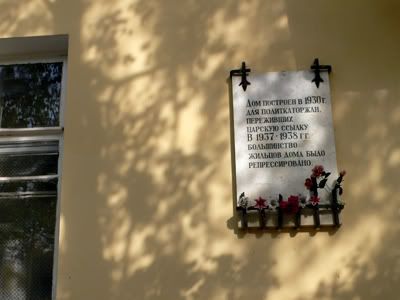
The sign reads:
***
To go to Nizhniy Novgorod, you have to buy a ticket for the Moscow-Gorky train. Only God knows why the Russian railway authorities insist on still using the city's old, pre-1990, name.
(Similarly, it's Leningradskaya Oblast - Leningrad Region - whereas the city has been re-named St. Petersburg over a decade ago.)
***
Here in Pushcha Vodytsya, there're plenty of old houses with carved-wood decorations - but they are deserted and, most likely, beyond repair. What a pity.
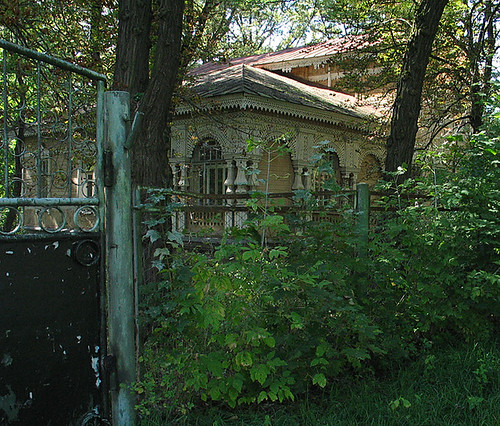
It could've been a very nice town, if it hadn't been for the Bolsheviks.
I was in Nizhniy four years ago - I don't remember much, probably because the Dubrovka/Nord-Ost hostage crisis happened too soon after the trip, but what I remember of the city isn't particularly nice. The weather was lousy, maybe that's why, or perhaps this is how my head functions, the way I notice only the shitty things in this part of the world, and they are the ones I end up remembering... What I remember of some people we met in Nizhniy is extremely nice, though.
Anyway, of the architecture, I remember being horrified by those wooden, dark-brown houses, once pretty, perhaps,but now looking like they are about to fall over, about to collapse and bury their inhabitants underneath the rubbish. These houses had the most beautiful carved decorations around the windows and below the roofs, but that didn't save the overall look. In Chernihiv, here in Ukraine, they have many houses like this, too, but they look a lot more cheerful, they do look cosy and are in a much better shape, and they are especially sweet in winter, when the icicles emphasize the carved patterns in a totally weird - and charming - way. I asked Mishah if he noticed the brown monsters in Nizhniy or perhaps I had dreamed them up, and he said that they were there alright, looking as ugly as I remembered them.
***
Mishah has posted four images from Nizhniy on his LJ - here. The first photo is of a "boutique" called "A Little Black Dress." The second is of the memorial sign on a residential building:

The sign reads:
This house was built in 1930 for the political exiles who had survived the Tsarist persecution. In 1937-38, most of the building's residents were executed.
***
To go to Nizhniy Novgorod, you have to buy a ticket for the Moscow-Gorky train. Only God knows why the Russian railway authorities insist on still using the city's old, pre-1990, name.
(Similarly, it's Leningradskaya Oblast - Leningrad Region - whereas the city has been re-named St. Petersburg over a decade ago.)
***
Here in Pushcha Vodytsya, there're plenty of old houses with carved-wood decorations - but they are deserted and, most likely, beyond repair. What a pity.

Sunday, October 01, 2006
Whenever the noise about Russian vs Ukrainian languages becomes unbearable, I think about India and its official languages: Hindi, Sanskrit, English, Assamese, Bengali, Bodo, Dogri, Gujarati, Kannada, Kashmiri, Konkani, Malayalam, Maithili, Manipuri, Marathi, Nepali, Oriya, Punjabi, Santali, Sindhi, Tamil, Telugu and Urdu.
And now there's a New York Times piece about the water situation in New Delhi:
And now there's a New York Times piece about the water situation in New Delhi:
[...] New Delhi’s water woes are typical of those of many Indian cities. Nationwide, the urban water distribution network is in such disrepair that no city can provide water from the public tap for more than a few hours a day.
An even bigger problem than demand is disposal. New Delhi can neither quench its thirst, nor adequately get rid of the ever bigger heaps of sewage that it produces. Some 45 percent of the population is not connected to the public sewerage system.
Those issues are amplified nationwide. More than 700 million Indians, or roughly two-thirds of the population, do not have adequate sanitation. Largely for lack of clean water, 2.1 million children under the age of 5 die each year, according to the United Nations.
[...]
The fabled Yamuna River, on whose banks this city was born more than 2,000 years ago, is a case study in the water management crisis confronting India.
In Hindu mythology, the Yamuna is considered to be a river that fell from heaven to earth. Today, it is a foul portrait of crippled infrastructure — and yet, still worshiped. From the bridges that soar across the river, the faithful toss coins and sweets, lovingly wrapped in plastic. They scatter the ashes of their dead.
In New Delhi the Yamuna itself is clinically dead.
As the Yamuna enters the capital, still relatively clean from its 246-mile descent from atop the Himalayas, the city’s public water agency, the New Delhi Jal Board, extracts 229 million gallons every day from the river, its largest single source of drinking water.
As the Yamuna leaves the city, it becomes the principal drain for New Delhi’s waste. Residents pour 950 million gallons of sewage into the river each day.
Coursing through the capital, the river becomes a noxious black thread. Clumps of raw sewage float on top. Methane gas gurgles on the surface.
It is hardly safe for fish, let alone bathing or drinking. A government audit found last year that the level of fecal coliform, one measure of filth, in the Yamuna was 100,000 times the safe limit for bathing.
[...]
New Delhi’s population, now 16 million, has expanded by roughly 41 percent in the last 15 years, officials estimate. As the number of people living — and defecating — in the city soars, on average more than half of the sewage they pour into the river goes untreated. [...]
Two years ago, Mishah's grandmother died. I loved her a lot and I still can't believe she's gone.
And Marta is 10 months old today.
Sometimes I feel that Mishah's grandmother somehow knows all about Marta. And sometimes it's really breaking my heart to think that she hasn't had the time to meet Marta.
Rest in peace, prababushka.
And Marta is 10 months old today.
Sometimes I feel that Mishah's grandmother somehow knows all about Marta. And sometimes it's really breaking my heart to think that she hasn't had the time to meet Marta.
Rest in peace, prababushka.
And here's an unusually short Zerkalo Nedeli piece (RUS):
At the end of the nine-hour session of the Cabinet of Ministers, prime minister [Yanukovych] remembered to mention that he was getting requests from numerous PMs to initiate amnesty for those citizens of Ukraine who were sentenced for their participation in falsifying the 2004 election (their sentences were suspended). We all understand what the matter is, said Victor Fyodorovych, and explained right away that teachers and mailmen were [...] "not the ones who ordered or organized [falsifications], they [merely carried them out. Right, Andrey Petrovich?" said the former presidential candidate, addressing vice premier Andrey Klyuyev... He said it and laughed loudly. And the audience [started laughing, too], for some reason.
I'm reading about the utilities and tariffs disasters - a typically endless piece in Zerkalo Nedeli (in Russian, though they'll probably translate it sometime next week). The piece covers Donetsk, Odesa and Zaporizhzhya regions (dry stats for the last two).
Here're two passages on hot water in Donetsk region:
Here're two passages on hot water in Donetsk region:
Donetsk region's housing and communal services system is extremely diverse and carries the traits of the reformative labors of all the previous Ukrainian governments. Most towns and villages are served old-fashionedly, by the companies working at the regional level - the water is supplied by DonetskOblVodoKanal, and DonetskTeploKommunEnergo is providing the heat in winter. There is no hot water in small towns. Only relatively big ones with the actively working industry have it - Donetsk, Mariupol, Kramatorsk and a few others. But the communal services there have been the property of local councils for a long time; in their own lingo, communal service employees call such water and heat suppliers "independent."
[...]
In cities with "independent" water and heat suppliers, the local governments were the first to raise the issue of the new tariffs. Officials read the Law on the Housing and Communal Services and realized that after gas and electricity prices go up, they'll either have to compensate for the losses of the communal services from local budgets, or raise prices to the "economically justified level." According to the mayors, there's no money for compensation - and there won't be any in the future. This is why local authorities were very determined in demanding understanding and approval of such an unpopular step by the population - and they even came close to using direct blackmail. For example, after gas prices went up July 1, they immediately turned off hot water in the seaside city of Mariupol. City officials announced that they'll return [it] only after the new tariffs have been adopted. Exactly one month later, on August 1, Mariupol began to live [with new tariffs]. Communal prices went up nearly twice, within the limits of the "region's average."
Subscribe to:
Comments (Atom)
